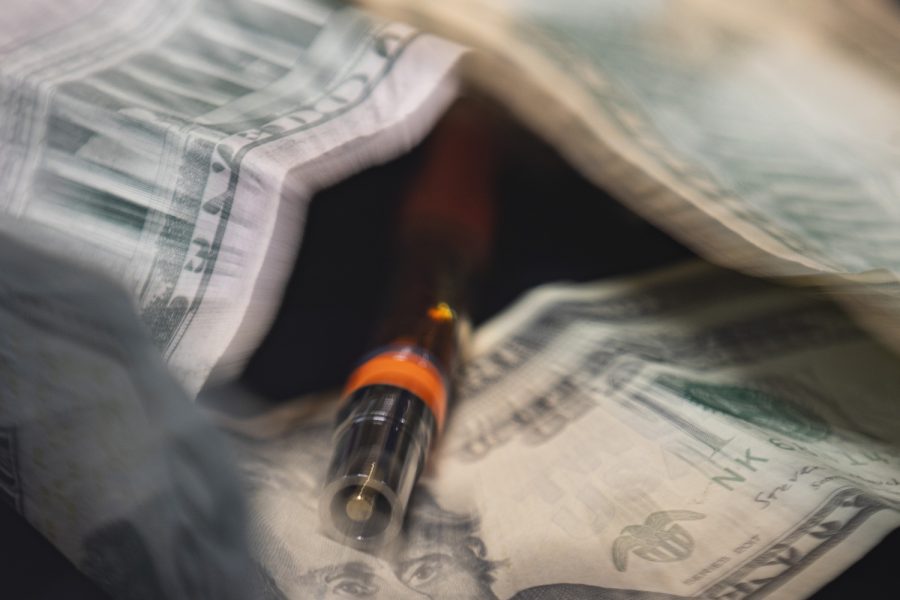Ops Blog | Pros and cons of marijuana legalization
The Daily Iowan opinions debate the pros and cons of legalizing recreational marijuana in Iowa.
Photo illustration by DI Staff.
April 18, 2023

Pro: Improve incarceration disparities
Despite the legalization of marijuana by many states in the U.S., there are still glaring racial disparities in both arrests and convictions.
According to the American Civil Liberties Union, Black people are 3.6 times more likely to be arrested for marijuana possession than white people, despite similar usage rates.
In every state, Black people are more likely to be arrested for possession than white people. In Montana and Kentucky, Black people are over nine times more likely to be arrested for possession.
While the arrest rate for white people stayed consistent throughout the decade, the arrest rate for Black people rose considerably. The best way to fix this injustice is to eliminate the cause at its root. There can’t be a difference in rates of possession arrests if there aren’t any arrests in the first place.
Keeping marijuana illegal has done nothing but cause harm and further perpetuate an unjust legal system.

Con: Safety concerns
One of the major disadvantages that people commonly raise with regards to recreational marijuana is that it can negatively impact one’s health.
To compound that, I believe that recreational marijuana use can have adverse effects on one’s safety. Specifically, side effects that come with marijuana use include dizziness, difficulty walking, overexcitability, lowered reaction time, etc. Considering all these effects, it is not unrealistic to assume that someone under the influence of marijuana could be prone to more accidents.
Granted, it could be minor accidents like bumping into someone on the streets, falling down some stairs, or other seemingly inconsequential incidents. However, it could be major accidents as well such as car crashes or other events that can result in grievous bodily harm.
Whatever it is, there is a way in which recreational marijuana use can pose a problem to one’s safety. It is relevant to note that other people’s safety can be threatened as well as it is very much possible for them to get caught up in accidents that result from recreational marijuana use, compounding the issue at hand.

Pro: Safer use
I believe that the legalization of marijuana could help regulate the drug, resulting in it becoming safer for use.
If marijuana were to be legalized, the government would have the ability to ensure that the marijuana is safe to use, free of any kinds of toxins that can be harmful. When bought on the street, an individual is unaware of whether the marijuana they are getting is safe. In this instance, it would be a lot better for the government to be involved.
Another good reason for the legalization of marijuana involves the government’s ability to regulate child-resistant packaging and age restrictions to prevent children from being exposed to the drug.
Lastly, it has been researched that with the legalization of medical marijuana, the number of traffic deaths have decreased by 11 percent. In that state of Iowa, the legalization of marijuana is a major legislative priority, citing that the use of this drug would be regulated to those that are 21 and up.

Con: Health implications
It’s important to consider the health effects of consuming marijuana.
Marijuana usage can cause paranoia or create a sense of losing touch with reality that can cause mild auditory and visual hallucinations. While this may be a part of the “high”, a large enough dosage can cause these effects to keep going for days after initially smoking. This can be extremely stressful and disorienting when trying to operate in daily life.
With a larger market for marijuana-laced edibles, consumers would have to watch out for what they buy. Edibles are very difficult to have an exact dosage of, since different companies can produce batches with varying amounts of THC in their products.

Pro: Safer alternative
As opposed to other drugs, marijuana is safe.
Its legalization for recreational purposes offers an alternative for some opioid users. It is not hard to find such substances unprescribed. Marijuana is a much safer substitute. One of the few substances that a person can suffer the most from when it comes to withdrawal symptoms, resulting in possible fatality, is alcohol.
Alcohol is widely used across the globe, as we know, and it is not seen as something that should be banned recreationally, though it causes much more addiction and suffering than marijuana. Marijuana is not only less addictive than alcohol, and it is also more natural and less toxic. Alcohol use is linked to aggressive behavior and violent crimes, and marijuana is not.
As a society, we should start treating marijuana as the safer alternative that it is.

Con: Gateway to other substances
There are some reasons to be okay with legalization of marijuana, but a lot of these points seem to miss some of the problems that come about through this legalization.
While marijuana on its own may not be the most devastating or problematic of drugs out there, there is the aspect that it serves as a possible gateway drug. Once exposed to drugs through the sale and then use of marijuana, someone might be keen to seek out the more dangerous and frowned upon such as crack, cocaine, or ecstasy to name a few.
Marijuana legalization may have some benefits, but there is still the unfortunate consequence that it has much like one could say about alcohol.
Once someone starts with marijuana, the chance is that the person will go onto other drugs. If marijuana is cut off, the risk of that happening dissipates somewhat.

Pro: Mental health treatment
A benefit of recreational marijuana — and to extending it beyond medical legalization — is the rising need for mental health treatment.
The COVID-19 pandemic both brought out more mental health issues and increased mental health awareness. Marijuana has been known to calm people down, and with extending the legalization to recreational use, we can have vendors with verified benefits. Another major impact on mental health is sleep, and marijuana can help people fall asleep faster.
There are what I call everyday problems that don’t fully constitute a medical requirement, nor necessarily a medical need to seek medical help for it. So having marijuana be more freely available could reduce the need for something else medically.
Overall, I think legalization gives the choice to the people. If you think it will improve your life, then you should be able to use it as you see fit. If not, then that shouldn’t limit the help it could offer others.

Con: Lack of resources
For now, cannabis should stay unlegalized until regulation and usage issues can be resolved.
The ongoing opioid crisis is an example of how unregulated societal drug introductions can lead to harmful effects without safe spaces to use, widely available anti-overdose drugs, and completed research on when using for fun or to mitigate pain crosses the line into dangerous levels of drug use.
While legalization in the future may be an option, we need to invest in social services set up to combat drug abuse, overdoses, and youth drug use. Legislators also need to reconcile and clearly communicate intoxication limits for motor vehicle operation and public consumption before placing substances in public hands.
Not only would solving these problems help in deciding if legalization of cannabis products is the best move forward, but these same conversations could be quickly and more easily applied to legalization discussions on other drugs in the future.

Pro: Tax revenue
Marijuana should be legalized because the U.S. government will be better able to regulate its use and generate billions in tax revenue from it.
When discussing the legality of drugs, it is important to pay attention to the failures of the Prohibition and how alcohol production has become controlled by illicit organizations. This led to a rise in gang violence between various bootleggers and mafiosos.
Violence that decreased dramatically after the prohibition era came to an end. Furthermore, the liquor industry has generated thousands of jobs for the economy and billions of dollars in tax revenue for the federal government.
It is estimated that the marijuana industry created 1000,000 jobs in the fiscal 2021 and billions in dollars of revenue. However, with the legality of marijuana in flux across the country, most ordinary people do not have access to the opportunities of the marijuana market.
Legalizing marijuana across the country would give people the opportunity to start their own marijuana business and get in on the lucrative trade while also providing a new tax base for the federal government.

Con: Black market
A potential consequence of legalizing marijuana in Iowa is the growth of an illicit marijuana market in the state.
States that have legalized marijuana have made significant contributions to the ever-growing black market of pot that competes alongside the legal market. These states develop their illicit markets by selling large quantities of their legally grown products to states where pot is currently illegal or criminalized.
One of the key dangers presented by black market pot is the risk of counterfeit and potentially dangerous products being distributed. Since the products are sourced and produced by unknown sources, the buyer may not be aware of the quality and safety of the product they are purchasing.
By legalizing marijuana, Iowa runs the risk of developing an illicit market that competes against the legal market and distributes unsafe products. With a larger black market, the health and safety of marijuana users can be jeopardized.
Columns reflect the opinions of the authors and are not necessarily those of the Editorial Board, The Daily Iowan, or other organizations in which the author may be involved.














